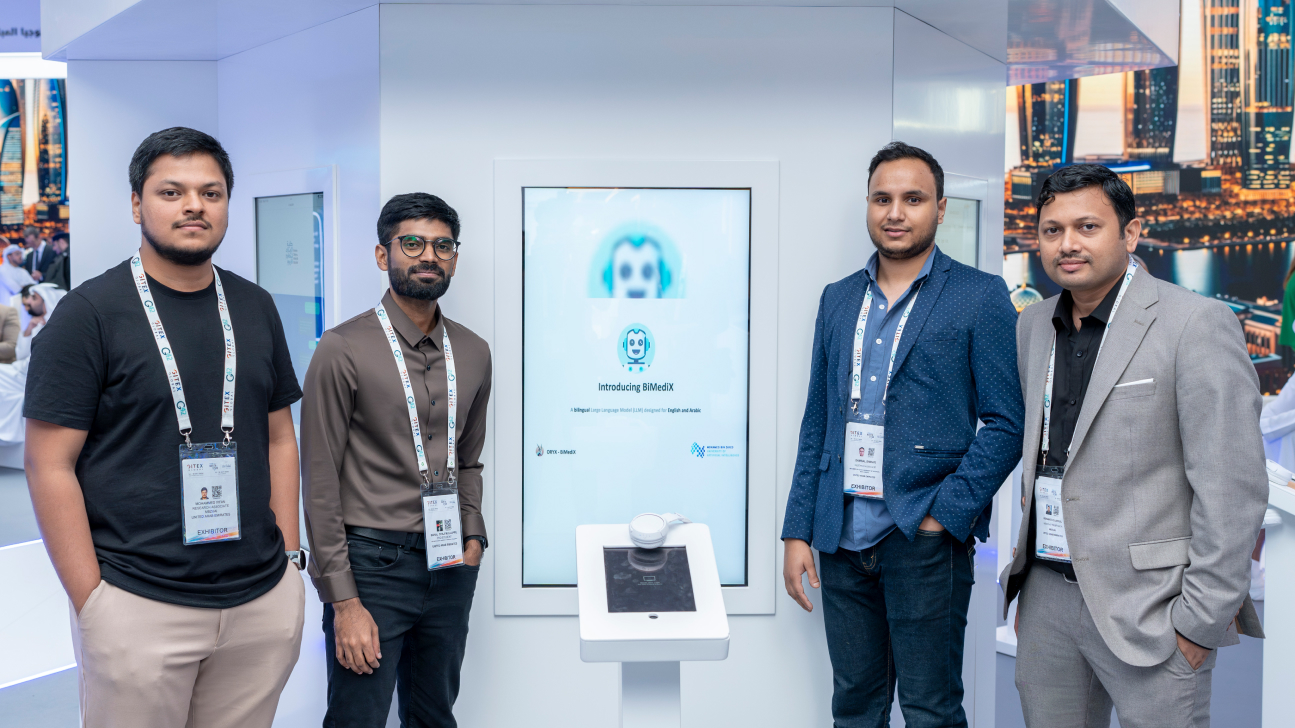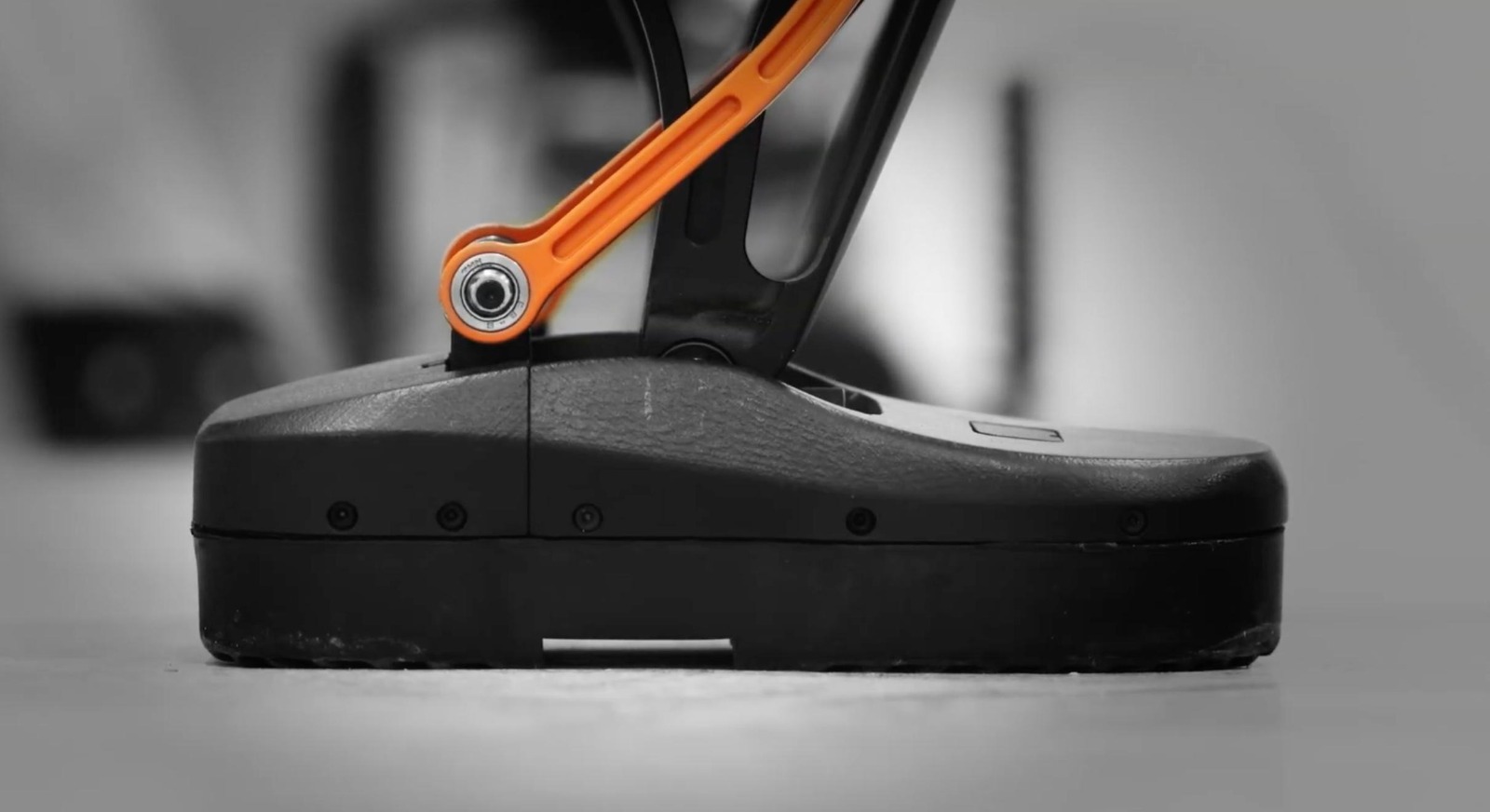MBZUAI’s bilingual healthcare model wins Meta award ahead of GITEX showcase
Monday, October 14, 2024

MBZUAI’s bilingual healthcare multi-modal model BiMediX2 has been named by Meta as one of the winners of its inaugural Llama Impact Innovation Awards, winning acclaim for its potential to solve healthcare accessibility challenges across the Middle East, Africa, and beyond.
The highly competitive award was launched to identify and recognize organizations across MENA, Turkey, Asia Pacific and Latin America that are using Meta’s Llama (Large Language Model Meta AI) to address local issues related to education, public services, economic development, and more.
As well as the Meta award, the project has received several other international recognitions, including the preliminary version of project, BiMediX, being accepted to the Findings of EMNLP 2024. The project was also presented at the AI for Sustainable Development Platform Launch Event (AI4SD), a side event of the 79th United Nations General Assembly (UNGA79) and has been integrated into the United Nations Development Program for potential use in telemedicine applications.
BiMediX2 was built using Llama 3.1 and is capable of understanding and responding to medical queries in both English and Arabic, as well as interpreting and summarizing medical images such as X-rays, MRIs, and CT scans. The model is also integrated as a chatbot on the Telegram platform, providing convenient accessibility on smartphones, including low-cost Android devices. The BiMediX2 chatbot also supports speech-in, speech-out functionality, allowing for verbal communication, which is particularly beneficial for illiterate populations, enabling them to ‘talk’ to the model in their native language.
“The model also has excellent capability to understand the various scenarios, ask follow-up questions, and provide answers to the users,” says Dr Hisham Cholakkal, assistant professor of computer vision at MBZUAI, who is leading the BiMediX2 project.
Making healthcare accessible
Following the success of the Meta award and other recognitions, Cholakkal and his team are currently showcasing the BiMediX2 project at GITEX, which is taking place in Dubai from October 14-18. There, visitors have the chance to watch demonstrations and try the model for themselves by asking it questions.
The verbal part is particularly important, explain Sahal Shaji Mullappilly and Mohammed Irfan Kurpath, the first authors of the BiMediX2 project, as it opens up its capabilities to people in remote areas who are either illiterate or have challenges typing their questions.
“We wanted to increase accessibility to marginalized societies in the Middle East and Africa, including illiterate people,” they say. “Now you can open the voice feature or voice messaging feature in Telegram and just talk to the model, explaining your symptoms or problems. You will get a response back in speech format in either English or Arabic. This tackles the language barrier and literacy barrier, which is very important.”
As well as the benefits for patients in remote or underserved areas, the model makes life easier for doctors, both in clinics and on telemedicine platforms, by reducing their workloads. By taking care of pre-screening processes, filtering many redundant or usual questions, and performing some early steps of the diagnosis process, BiMediX2 can save valuable time for already busy medical professionals.
“It is well known that there is a shortage of experienced doctors and physicians across the globe,” says Cholakkal. “This scarcity or shortage is much more severe in the underserved communities in the Middle East and Africa. BiMediX2 can filter out straightforward scenarios, so that doctors’ quality time is spent on more challenging or complicated scenarios. And for situations where a clinical examination is really required, we are currently working on a feature to help book appointments in a healthcare facility that is geographically close to the patient, finding nearby doctors with the speciality that is required for the treatment.”
Joining the wider effort
To emphasise the significance of BiMediX2, Cholakkal and other MBZUAI faculty and leaders were part of a UAE delegation at the 79th session of the United Nations General Assembly in September. During a sideline event, the UAE and United Nations Development Program (UNDP) launched AI4SD (Artificial Intelligence for Sustainable Development), a new platform that BiMediX2 could soon join.
With MBZUAI as a main partner, AI4SD offers open-source AI models, datasets, training resources, and a collaborative space for exchanging insights on leveraging AI to achieve the UN’s Sustainable Development Goals.
MBZUAI President and University Professor, Eric Xing, said at the event: “At MBZUAI, we are proud to contribute to the AI4SD platform by making six AI models accessible to tackle some of the most urgent global challenges. Our focus on AI for health and sustainable development reflects our commitment to driving real-world impact. As a leading research university dedicated to artificial intelligence, we are committed to harnessing the power of AI responsibly to empower policymakers and social entrepreneurs to advance the Sustainable Development Goals.”
For Cholakkal, this kind of initiative strikes at the heart of what BiMediX2 aims to do.
“UNDP has several measures to improve the healthcare reach into countries across the Middle East and Africa that have resource-constrained populations by introducing low-cost or free telemedicine,” he says.
“We are in discussion with them to be part of these measures and provide important support across the region. This could really scale up the UNDP’s efforts to improve the reach of healthcare facilities to the underserved communities, especially with the benefit of the Arabic language support.”
Cholakkal adds that these developments, along with the Meta award, acceptance of the research paper at top NLP conference, EMNLP 2024 (findings), and GITEX demonstration, highlight not only BiMediX2’s potential impact, but also the calibre of research coming out of MBZUAI.
“The entire BiMediX2 team, the students and researchers, is from within MBZUAI, with significant contributions from the students. This says a lot about the excellent quality of research work that is taking place here, and this “made in MBZUAI” model is something that we must be proud of.”
- healthcare ,
- GITEX ,
- llm ,
- LMM ,
- Gitex 2024 ,
- telemedicine ,
- award ,
- accessibility ,
- AI4SD ,
- medical ,
Related
MBZUAI and Minerva Humanoids announce strategic research partnership to advance humanoid robotics for applications in the energy sector
The partnership will facilitate the development of next-generation humanoid robotics tailored for safety-critical industrial operations.
Read MoreAI and the silver screen: how cinema has imagined intelligent machines
Movies have given audiences countless visions of how artificial intelligence might affect our lives. Here are some.....
- AI ,
- cinema ,
- art ,
- fiction ,
- science fiction ,
- artificial intelligence ,
Special delivery: a new, realistic measure of vehicle routing algorithms
A new benchmark by researchers at MBZUAI simulates the unpredictable nature of delivery in cities, helping logistics.....
- delivery ,
- logistics ,
- machine learning ,
- research ,
- computer vision ,
- conference ,
- neurips ,
- benchmark ,


